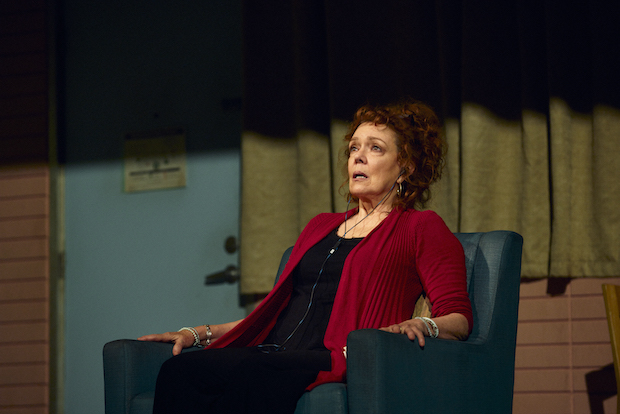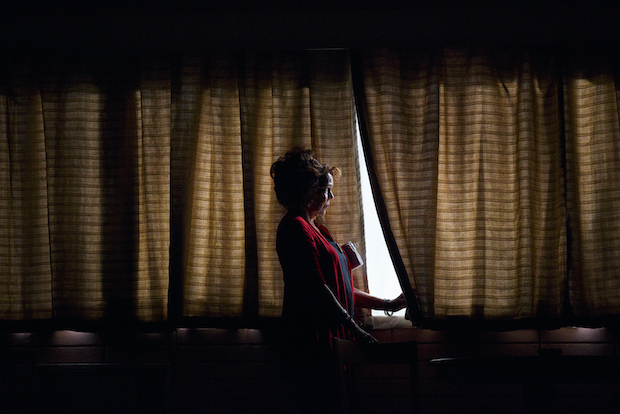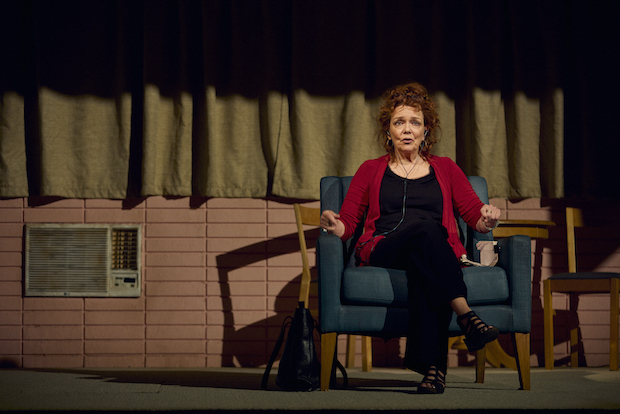Interview: Deirdre O'Connell on the Thrills and Fears of Bringing Dana H. to Broadway
O’Connell stars in this true crime drama about a woman kidnapped by a white supremacist.
To say that Deirdre O'Connell has one of the hardest jobs on Broadway right now is probably an understatement. O'Connell is delivering a "How did she do that?" kind of performance in Lucas Hnath's Dana H., a solo drama about a woman who is kidnapped by a white supremacist and survives to tell the tale. The Dana of the title is Hnath's mother, Dana Higginbotham, and for the duration of Les Waters's 75-minute production at the Lyceum Theatre, O'Connell is lip-syncing Higginbotham's own voice and words.
This is O'Connell's fourth time doing the play — it ran at the Goodman in Chicago, Center Theatre Group in Los Angeles, and off-Broadway at the Vineyard right before the pandemic struck — and while she was worried that the repetition would eventually get to her, this experience has proven the exact opposite. Each subsequent run has given her more and more insight into what she calls the "empathy machine" that is both the play and Higginbotham herself, and the Broadway experience is allowing her to challenge audiences in a way that she feels they've always wanted.
This conversation has been condensed and edited for clarity.

(© Chad Batka)
I said this during the Vineyard run, but I really don't know how you can do this play night after night.
One of the really great things about this model is that I don't do it every night [the play runs in repertory with Is This A Room]. It's partly just a hard play to live with all the time, but also, the technical task is a weird neurological challenge. I would find that by Sunday nights I would just become unreliable, that there was something misfiring in the way the track was working and I was always wrong. My brain started to become…It was interesting. So it was a relief to think that I'll be able to at least keep my brain hearing it. Because I don't think you're supposed to do this particular task eight time a week. Not even for your emotions, but for your brain.
You were always supposed to come back and do the play again at the Vineyard. What went through your head when you heard that it was going to be on Broadway instead?
First of all, we were pretty clear, Les and Lucas and I, that if it seemed like it didn't actually work in a house that big, then it wasn't a good idea. The piece had to function in the new place, and if it didn't, it wouldn't be worth doing, because it has so much to do with watching my face very closely. I wasn't going to start dancing around.
We took a day and went into three closed theaters and I would sit in a chair and everyone would look and run at the angles. We found that it worked really beautifully in the Lyceum. I do feel like we hit a sweet spot, and I don't know if this could have happened if the whole world hadn't been turned upside down on about 50 levels.
I still pinch myself because I'm sure we all felt, when we thought of coming back, that we didn't want to do the exact same thing, but in this case, to just change the venue meant that we were actually taking the thing we had already built and loved and trying to offer it as part of the next challenge for how the commercial theater actually works. Can the commercial theater handle more experimental work? Can it work with people doing things in rep? Have we been underestimating the audience this whole time? Which is my belief, because I think we have.

(© Chad Batka)
Has it lived in your muscle memory over the past 18 months? Like did you have to go back and relearn it all and listen to the tapes to get it back into your body?
I spent a couple of weeks listening to it, and then I gave myself a little break and did some other things. I was like "OK, now I'm taking a vacation." And then I went back to it. I would say it took about six weeks altogether of just like, this was my day job. I had to listen to it a bunch of times and drill it at least once a day. I very much wanted to find something new.
I feel like every time I've had to do it, and this will be the fourth run, that I've had to go back and do that. And in a funny way, it's gotten more and more and more precise, but also more difficult because my standard of precision is so high now that I don't forgive myself of the tiny, tiny mistakes anymore. Whereas, I remember three years ago, I was much easier on myself. But, I mean, I have to forgive myself within a second. Because there's no time.
Do you think about your own personal safety doing this piece and telling this story, which is about a real woman who gets abducted by a very real organization?
I don't think about it because I can't think about it. I remember one time, I was in a theater where something happened — somebody crazy was in the theater and all of a sudden, everybody knew that somebody was shouting and something crazy was going on. It made me realize that we always put this enormous amount of trust in the fact that it's 800 people in a room together and nobody is going to do anything nuts. And we're more and more cautious now. We make sure that everyone's vaccinated. We make sure you don't have a gun. We do all of those things and you get into this mode where you're like, "This won't happen," because as soon as you go down the road where it could happen, you can't face the reality of "I'm gonna go sit in this little blue chair in front of all these people and they really could do anything they want."
I think for Lucas and Dana, that was a serious consideration that they have thought long and hard about in terms of moving to Broadway. It's been completely part of the deal each and every step of the way — if this starts to feel not safe, we can stop. I've kind of leaned into their sense of safety, and part of it is just a decision that I think even she would say. At this point, to be in the actual world and not operating from fear is the risk I'm willing to take.
What's been the most surprising element of this whole journey for you as a performer?
My fear was that it would feel like it was exactly the same every time and that I would feel like I was going to lose my mind having spent three years doing the exact same thing. But the experience of doing the piece every single time is very different and I would not have seen that coming. And Steve, who was the lip-sync coach, said that I will experience that. It's a lip-sync thing. People hear it and it sounds different every time you strap on those headphones. I couldn't understand what he was talking about really until I started performing it, because that was when I was under that pressure. Some days it sounds very open-spirited, some days it sounds like she's sad. And to be putting myself up against the same hour and 14 minutes of material day after day and having it just keep growing new revelations and information, I wouldn't have seen that coming. It's like a strange Zen practice that I've been given.

(© Chad Batka)










